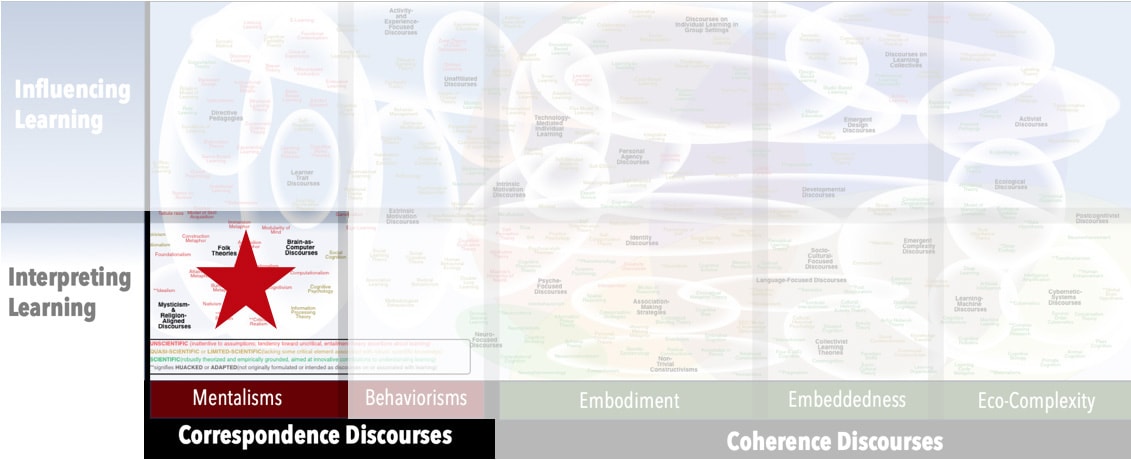AKA
Platonic Realism
Platonism
Focus
Positioning the ideational and spiritual as the only truthsPrincipal Metaphors
- Knowledge is … scope of all ideas
- Knowing is … holding ideas
- Learner is … idea-haver (individual)
- Learning is … realizing/developing ideas
- Teaching is … urging
Originated
Ancient (first formally described by ancient Greeks)Synopsis
Idealism might perhaps be better dubbed “idea-ism.” It refers to a range of perspectives that assert that ideas are the only true reality. Most Idealisms accept that there is a material world, but that world is seen to be lesser – subject to change, unstable, uncertain, and corruptible. Associated constructs and theories include- Epistemological Idealism – reality can only be known through ideas
- Intellectualism – any perspective that prioritizes thought or the activity of the mind (i.e., the “intellect”). Among others, these include Idealism, Rationalism, and those theories in Psychology that emphasis cognitive states.
- Logocentrism – the belief that words can represent presence, essence, truth, and/or reality, and thus act as the foundation of all human thought, language, and experience
- Metaphysical Idealism – interpreted experience is all that is real
- Naïve Idealism – the perspective that “reality” is one’s own mental creation (Contrast: Naïve Realism, under Realism.) (Note: The phrase Naïve Idealism is also used to describe over-optimistic, but unrealistic and/or under-considered, modes of thinking, often associated with adolescents and religious fanatics.)
- Objective Idealism – an objective consciousness exists prior to and independent of human consciousness
- Platonic Idealism (Theory of Forms) – abstracted ideas are more real than perceptions
- Phenomenalism – physical objects exist only as sensory stimuli or perceptions
- Reminiscence Theory of Knowledge (Plato, c. 400 BCE) – an elaboration of Platonic Idealism that presses into matters of learning. Built on the premise that all knowledge is always and already present in the ideal realm, the theory asserts that learning is a process of recollection or recovery of such knowledge – aided by processes such as the Socratic Method.
- Subjective Idealism (Immaterialism) (George Berkeley, 1720s)– sensory experiences are more important than abstracted ideas
Commentary
Idealism was largely discounted and dismissed through the 20th century. In the current literature, it is often seen a primitive or unsophisticated as it is contrasted with “more realistic” or “non-ideal” perspectives:- Ideal Theory vs. Non-Ideal Theory (John Rawls, 1990s) – a contrast proposed to describe the evolution of practical theories, suggesting that one starts with an Ideal Theory (e.g., involving universal compliance with principles and/or oriented to a utopian endstate) that serves as a precursor to a Non-Ideal Theory (e.g., involving partial compliance with principles and/or embracing an always-evolving horizon)
Authors and/or Prominent Influences
Ancient GreeksStatus as a Theory of Learning
Idealism is a theory of existence and knowledge that infuses many popular beliefs and assumptions about learning. As such, it can be described as highly influential of common perspective of learning, if not a proper learning theory itself.Status as a Theory of Teaching
Idealism is not a theory of teaching.Status as a Scientific Theory
Idealism is not a scientific theory.Subdiscourses:
- Epistemological Idealism
- Ideal Theory vs. Non-Ideal Theory
- Intellectualism
- Metaphysical Idealism
- Naïve Idealism
- Objective Idealism
- Phenomenalism
- Platonic Idealism (Theory of Forms)
- Reminiscence Theory of Knowledge
- Subjective Idealism (Immaterialism)
Map Location

Please cite this article as:
Davis, B., & Francis, K. (2024). “Idealism” in Discourses on Learning in Education. https://learningdiscourses.com.
⇦ Back to Map
⇦ Back to List
